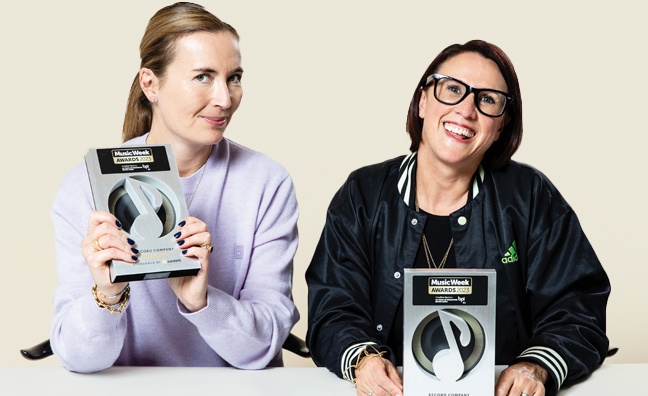Last year, Rebecca Allen and Jo Charrington became co-presidents of a revamped EMI that integrated Capitol Records. Since then, the Universal label has won Record Company Of The Year at the Music Week Awards 2023, reclaimed its market-leading position, opened a new division in the North and worked on everyone from Taylor Swift, Elton John, Lewis Capaldi and Take That, to breaking acts like Olivia Dean, Mae Stephens and Caity Baser. Here, in an exclusive interview with Music Week, they sit back and reflect on their victorious new era for the first time…
Words: George Garner Photos: Louise Haywood-Schiefer
Long before the two joined forces as the co-presidents of EMI in 2022, Becky Allen says she always had her eye on Jo Charrington. This dates back to when she was president of Decca, while Charrington led fellow Universal label Capitol with Nick Raphael. It wasn’t stalking, FYI. Allen prefers another term.
“I had been flirting!” laughs Allen. “Jo and Nick were ‘a thing’, and I never thought I’d get a look-in. It was like watching a marriage.”
“We were very happily married for a long time,” says Charrington, saluting Raphael as she sits opposite Allen in Universal’s London HQ.
“I was so respectful of Nick and Jo, and they were always really lovely,” continues Allen. “When I was made president of Decca they sent me flowers, and when I got the EMI job.”
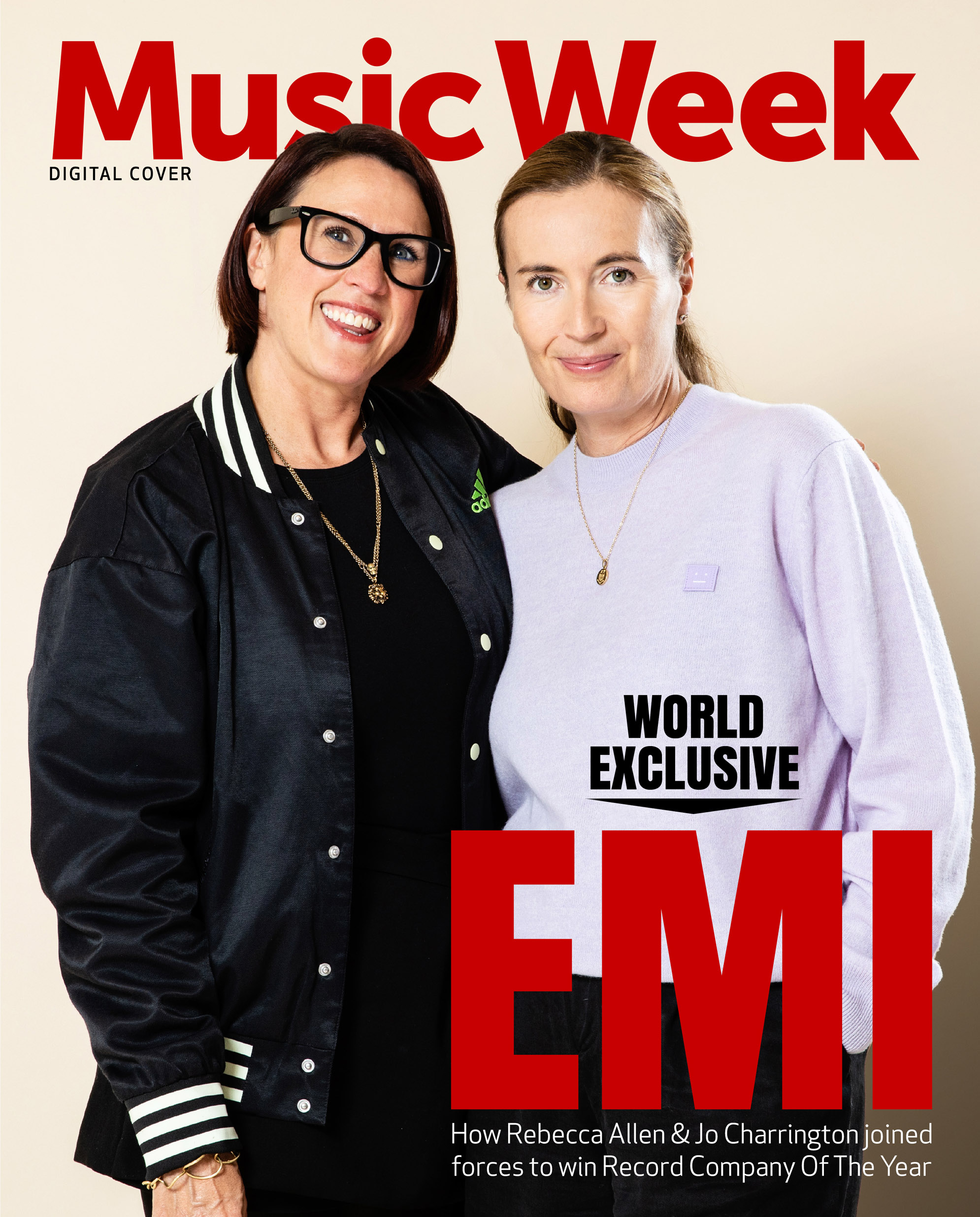
The pair had often found themselves attending “quite male-heavy” conferences. They’d catch up, and even go on morning runs together.
“Jo and I got quite close over the past few years,” says Allen. “She won Businesswoman Of The Year [at the Music Week Women In Music Awards 2015] before me, so Jo was always an inspiration. I flirted with her but didn’t ever imagine that we would end up in a partnership.”
For a while that was how things worked. Allen ran EMI – a role she assumed mid-pandemic in 2020, having enjoyed huge success with the likes of Gregory Porter, Ludovico Einaudi, Rod Stewart, Michael Ball & Alfie Boe, Sheku Kanneh-Mason and Andrea Bocelli at Decca. Likewise, Charrington led Capitol, after Raphael exited the label in early 2022. Allen never expected they would cross paths. Fate had other plans, however. Or rather, Universal Music UK CEO and chairman David Joseph did.
“When David said, ‘I’m thinking of joining Capitol and EMI with you and Jo doing this together,’ honestly, I couldn’t think of anyone better that I’d rather do this with,” beams Allen. “I was building an amazing label, but without great A&R, what is it for, right? The thought of working with Jo, and knowing how focused she is on the quality of music and how people are drawn to her was so appealing. Artists are drawn to her…”
“Or scared of me!” quips Charrington in reply.
Charrington’s A&R superpowers speak for themselves. In her nine years at Capitol, she oversaw the success of Sam Smith as well as Aitch, 5 Seconds Of Summer, Mae Muller and Zoe Wees. Her A&R career has seen her sign and/or A&R 30 platinum or multi-platinum albums, while also boasting experience in marketing, international and artist management.
“I loved that Becky respected A&R,” says Charrington. “That is the foundation of who I am, and hearing that was really, really important. There’s mutual respect. I can’t do my best work if that’s not there.”
Just 18 months in, that mutual respect helped EMI win Record Company Of The Year at the Music Week Awards 2023. The victory was followed by an office party that involved, to quote Allen, “a lot of tequila”.
“We were chuffed to bits,” reflects Charrington.
“It really meant a lot,” continues Allen. “Neither of us had won that award and to get it in our first 18 months together felt pretty special.”
Music Week has been granted the duo’s first joint interview since their co-presidency began, and we join them in a side-room on EMI’s floor. A side-room and not, it should be stated, in one of their individual offices. They don’t have them. Part of a “new culture” at EMI, both Allen and Charrington sit out on the floor with their teams in an open-plan set-up.
“People vying for an office creates a layer of politics that takes away from the graft and meaning of what we do,” says Charrington. “We love sitting out there – you can see who’s actually in [laughs].”
“We’re super-gossipy, too!” grins Allen.
This is a typical exchange of our interview today. To be caught in the pair’s conversational cross-fire is a riot; when the two aren’t listening to each other intently, they’re finishing each other’s sentences.
Just as Allen and Charrington like to be at the heart of their staff, so too has their label operated at the epicentre of many of 2023’s biggest music headlines. With No.1s via Taylor Swift’s 1989 (Taylor’s Version) (225,299 sales, according to Official Charts Company data), Take That’s This Life, and Lewis Capaldi’s Broken By Desire To Be Heavenly Sent (196,117 sales), EMI have the three fastest-selling albums of the year domestically.
“That is about a long-standing relationship where the time has been put in with the artist and the artist puts the time into the UK,” hails Allen of the all-conquering Swift and EMI’s union. “That’s always important about Taylor. She really, really cares about her UK fanbase.”
EMI also helped Elton John walk the final steps of his triumphant Farewell Yellow Brick Road world tour, including that Glastonbury headline slot.
“I mean, that says it all for me,” says Allen, pointing to a signed photo of the Rocket Man playing Worthy Farm.
Do you ever get used to things like that, Music Week enquires?
“No!” she hoots. “I’ve had many ‘cry’ moments. For The Lockdown Sessions album, Elton asked me to sit next to him while he played us songs. I’m a massive Stevie Wonder fan and there was a song [Finish Line] that he and Stevie are on. He asked me what I thought and I literally had tears in my eyes. You could never get bored of that! For me, he is one of the greatest artists of all time. He leans into the label. He talks to the team. [Rocket Music’s] David Furnish and Rachael Paley lean into the company. It’s a perfect working relationship between management, artist and label.”
“Elton celebrates young artists,” adds Charrington in praise. “Look at how he got together [to meet] with Olivia Dean at Glastonbury. That’s the dream roster: co-signing one of your biggest up-and-coming stars.”
Asked if there was one moment where their co-presidency really felt like it clicked, Allen suggests it was at this year’s Mercury Nominations. While eventually losing out to Ezra Collective, EMI secured an impressive three nods courtesy of Olivia Dean – someone Charrington almost signed at Capitol, and who scored a Top 5 chart position with her debut Messy in June – Loyle Carner and Music Week cover star Jessie Ware.
Elsewhere, EMI hails Mae Stephens for being the biggest brand-new signed developing act globally, with the If We Ever Broke Up singer also the highest streaming domestically-signed artist for UMG globally. “Mae has the biggest UMG record in China this year,” says Charrington, proudly. Both Allen and Charrington are quick to praise Universal’s international marketing team, led by president Nickie Owen, for their work on the project.
Caity Baser, meanwhile, notched up over 100 million global streams and has just put 40,000 tickets on sale for her next tour.
“When we signed Caity, we were in the deal process and then she had a TikTok moment,” says Charrington, stressing that their A&R is ahead of algorithms. “Luckily, we had already signed her and then all the other labels were jumping on it but for the wrong reasons. We believed in her without the TikTok moment. You’ve got to believe in your artists.”
EMI also oversaw Sam Smith’s bold musical reinvention (the star’s post-Unholy success story resulted in No.1 album Gloria back in February and a sold-out worldwide arena tour), the resurgence of Chase & Status (who recently enjoyed three simultaneous Top 20 singles) and the ongoing rebirth of Positiva, which Charrington hails as “the most iconic dance imprint in the country”. All of this without mentioning No.1s for Metallica and Shania Twain, plus TikTok virality for Bastille.
It’s not just in the charts that EMI is making moves either. In January, it became the first major to open a Northern office. Christened EMI North, it is overseen by Clive Cawley, who moved from his previous MD role to become its new president.
“Clive Cawley, King Of The Norf!” proclaims Charrington, like she’s auditioning for Game Of Thrones. “It’s not all about London, it’s about great artists north of Watford.”
“In fairness to Clive, it was his idea,” praises Allen. “He had the idea and made it happen really quickly. He’s got his own amazing team in Leeds – they’ve got their own offices and identity, and then when he needs it, he’ll draw on our resources.”
So where does all of this activity leave EMI? In October, according to Official Charts Company data, EMI was the clear No.1 so far based on market share. Even before its slew of Q4 heavy hitters like Take That and Taylor Swift, in terms of market share at the end of Q3 this year, EMI was in the lead for All Music All Albums with an 11% share. Significantly, EMI also pulled ahead in the Track Streams metric for market share. EMI has a 10.9% share and has increased streaming consumption by 18% year-on-year, compared to market growth of 11%.
Behind this is another victory, too, that links with the industry nickname they’ve been given – one that they love, for the record. ShEMI.
“I think subconsciously – because I don’t think it’s super-conscious – being two women running a frontline label, that’s quite a… I don’t want to say a weight, but we take it seriously,” begins Charrington.
“When you first become ‘a woman in music’ and you’re succeeding, that’s something that you want people to aspire to be,” explains Allen. “Then, when I became a mother, that’s something that you want to navigate successfully so other women can navigate it. And then you go past the kids bit, and we become the women that we are today and you take that as a responsibility. We’re really honest; there are definitely highs and lows of being a woman in music and being a mother in music. We both had a lot of lessons raising kids and doing these jobs that we can now impart on some brilliant women on the floor.”
“You’re absolutely right,” nods Charrington. “It’s really important to show that you can have it all. It’s not easy. Us being two women is a superpower. It’s a great USP. A lot of our artists, particularly female artists, love the fact that there are two female presidents.”
Between pushing talent in the charts and behind the scenes (in January this year, EMI appointed Lucy Dann as its MD), winning awards, breaking records and making bold new expansions, there’s a lot to take in. And not just for Music Week. The flirting has come a long way.
“By the way, she’s soooo good at it!” smiles Charrington. “This is giving us a bit of perspective on what we’ve achieved together.”
While we’re at it, let’s see if we can shed some more perspective…
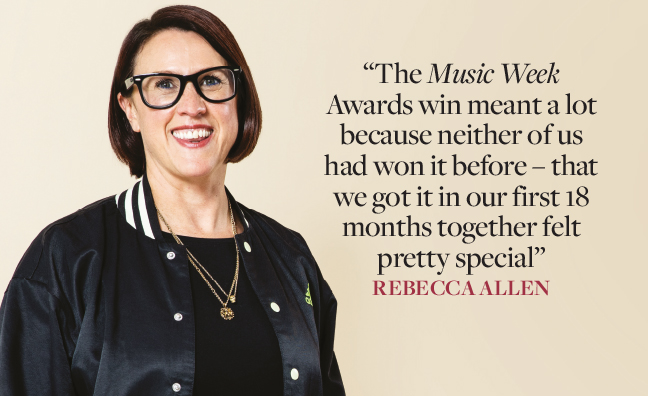
You both said you were surprised that your Record Company Of The Year win came so early into your co-presidential stint. Why?
Rebecca Allen: “Because we’re still quite a new team. We’re only 18 months in together, although Jo and I have known each other a long time. It felt like, ‘If we can win something as special as that in 18 months, what can we do in another period of time?’”
Jo Charrington: “We’re so, so in amongst it – and that goes back to sitting on the floor with everyone – that we don’t have a lot of time to look up and go, ‘Oh, wow, this is amazing.’ We celebrated but we don’t take it for granted. Neither of us do. We’re always like, ‘What can we do better?’ We’re very critical of ourselves, probably too much sometimes. You don’t want to let your artists, managers and team down because they’re all working so hard. The win was a big deal; it gave us confidence that what we’re doing is starting to work.”
Jo, you mentioned Becky’s deep appreciation of A&R before, but what else made joining forces with her at EMI so appealing?
JC: “At Capitol, Nick and I had the most incredible run – and if he were here, he’d be telling you all the stats of how amazing we were! But I’d always been slightly jealous and would say to him sometimes, ‘Wouldn’t it be nice to have a bigger roster where we can cross-pollinate?’ It was the thought of working with a bigger team, bringing some executives through, working with more established artists. EMI has got such an incredibly rich roster. It’s the crown jewels. That was a big, big draw for me. I was ready for a switch up. It was exciting, and scary, obviously. When it was put to me, ‘We’d like you to run Capitol,’ and then later with the EMI thing, I was terrified. I remember that Christmas, I was all over the place.”
How come, when you were already a president?
JC: “Because it was a huge responsibility. With the artists signed to EMI, it’s a serious proposition. I had always stayed away from the more corporate-heavy side of what we do. Capitol was a small company so I was quite protected. It was daunting, but exciting. I was weighing it up, like, ‘Have I got what it takes?’ There’s absolutely no way I would have done it without Becky’s counsel and the way she talked me through things. When I started, it was really… Overwhelming is the word I would use. Every step of the way, she talked me through her experience, which is really different to mine. She’s just so impressive with how she manages stressful situations and has worked on a macro scale, which I hadn’t done before.”
Becky, what has Jo brought to the table in your eyes?
RA: “I knew I could do so much with EMI, and that there are some amazing people on the floor. But unless you’ve got great A&R, ears, instincts and experience, it’s really hard. The minute David said, ‘I want to put you two together,’ I knew that it was a perfect fit. I know that I can run a company, I know about marketing, media and the commercial side. But I’m not an A&R. David once taught me that you have to work with your weaknesses, and that means accepting the bits that you can’t do – and the part that I couldn’t do is what Jo does so brilliantly. That’s why it’s worked so well. Because we’ve been around so long, we’re both very comfortable with what we’re not good at.”
Everything sounds very harmonious so far. But what happens when you don’t agree on something as co-presidents?
JC: “We both agree that there’s no right or wrong ever with this game. It’s about making decisions. Becky’s really decisive, and I’m really decisive. One of us will lead more on one thing naturally, so it might be me leading on Sam Smith or Becky leading on Lewis Capaldi. But if we need help, we’ll ask each other. We’re both super-solution-based. We hate moaners. It’s like, ‘Okay, this isn’t working, how are we gonna fix it?’ Becky’s always great with solutions. Maybe I blank out disagreements? There’s been no major, fundamental differences.”
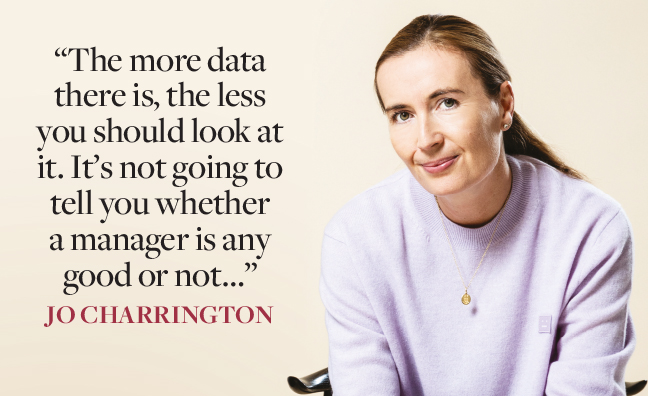
Did Sir Lucian Grainge and David Joseph offer any advice?
JC: “Well, from my point of view, just the fact that David believed in me… I needed that belief to consider taking this role. He believes in both of us. He’s there when you need him and lets us get on with it when we don’t. Plus, we’ve got each other to sense-check stuff with as well.”
RA: “David’s a really empowering boss, and Lucian is always there. We still do A&R meetings if he’s in town – he’s an incredible A&R man. He wants us to play all the music and that’s brilliant.”
JC: “As long as you’ve got a good song up your sleeve!”
Let’s talk about some of EMI’s successes of late. As it stands, you’re leading the All Music All Albums market share…
RA: “Can I just say, the one that we’re most proud of, because we haven’t always been the leader on it, is the Tracks Streams one. We feel so proud of that, because that’s the one that RCA were always [ahead on].”
JC: “We’re very conscious of not having planes on runways for the sake of it – we put out records because they’re fucking great. Even when things don’t go quite according to plan, the team is learning the nuance of working songs. It’s just like having a muscle: the more you use it, the stronger it gets.”
Competition is fierce. What would you say to critics who might say, ‘EMI are only No.1 because it merged with Capitol’ or, ‘They’ve got Taylor Swift, so of course they’re top’?
RA: “I’d love to answer this because I feel quite strongly about it. We must never be apologetic for having Taylor Swift as part of our company. People in this label were at her first show in London, a very small gig, about 15 years ago.
People on this floor were there and pitched to get Taylor into Mercury, who at that time were the label, so it was not a given that we were going to get her. We work super-hard to retain that relationship with Taylor, because Taylor is CEO of her world, and her team, who are best in class.”
JC: “You can always find an ‘Achilles heel’ in something. The album campaign for Gloria definitely benefited from the combined forces of Capitol and EMI. Sam is in a better position now the teams have joined forces – we’ve added value by being together.”
RA: “I get it. I wasn’t there at the beginning of Elton’s career, and neither was Jo. But actually, what we’ve done with Elton in the past three years has been incredible. We delivered a No.1 single with Dua Lipa that’s still a massive hit globally. Artist development is not just about the beginning. I look back to my days at Decca, artists took two or three albums before they had their success. A lot of labels do artist development at the start really well, but are they still super-serving them 10 years later? That’s why we feel so proud of Chase & Status, Bastille and Jessie Ware. We may not have signed the artists 15 years ago, but they’re as important to us today as they would have been when they first signed. We treat them like new artists.”
When it comes to signing new acts, what do you lean more on, data or instinct?
JC: “The best algorithm is this [puts her hand on her heart]. The more data there is, the less you should look at it. It’s just too overwhelming. Data is not going to tell you whether a manager is any good. The relationship me and Becky have with our artists and managers is, nine times out of 10, really strong. The key is getting back to basics. All the artists we’ve mentioned today, they’re all fucking brilliant. They work hard, they’re talented, and have great teams. We do meetings sometimes and I’ll be like, ‘Do we know what we’re doing?’ but then we’ll play a song and it’s like, ‘There we are! That’s why I do this job – we’ve got a fucking great record, let’s figure the rest out!’”
What are the downsides of the job?
JC: “You know what you said about people poking holes? That is fucking depressing, actually. It doesn’t do any good to get caught up in music industry bitchy, gossipy stuff. You’re better off honing in on what’s important.”
RA: “We definitely agree on that. If you watch athletes when they’re about to run 100 metres, none of them are looking left or right. They look down their lane and visualise their win. That is what Jo and I are very aligned on. I can’t worry what Warner, Sony or whoever are doing or saying about us. When we do, that’s when it gets hard. When we’re just focusing on our great artists, that is when we win.”
There’s lots of debate about the lack of breaking stars this year. Is the talent not there?
RA: “Well, what’s the definition of breaking an artist? At Decca it was all about longevity. That’s where we saw our success. There’s always been an impatience in this business. Whether you’re still with an artist four or five albums in, that’s success for me. I look at someone like Olivia Dean, who we’re three or four years in with, and she’s now really getting going. Olivia will get 15 to 20 years in. That’s what we believe.”
JC: “If you look back at the biggest domestically signed UK artists over the last 10 or 15 years, it’s basically Amy Winehouse, Adele, Sam Smith, Ed Sheeran and Dua Lipa. Since they broke, the landscape has changed – there are more ways for artists to release with distro companies and independent labels, there’s more competition and people have less time. The attention economy has completely changed, it’s way harder than it used to be. But the talent is still there. One million per cent.”
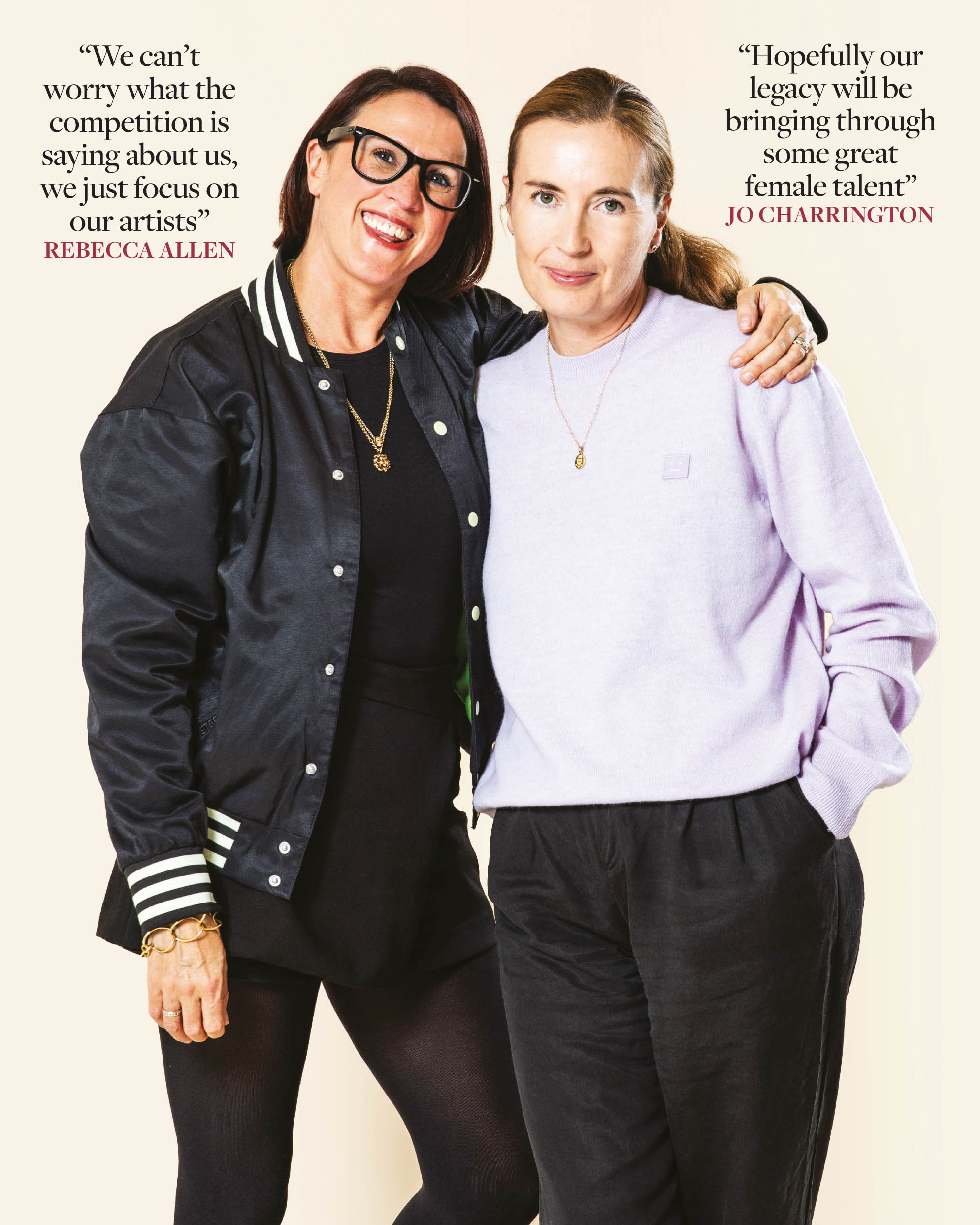
You mentioned the range of options artists have these days. What do you say to lure acts to EMI who are considering a distribution or indie deal?
RA: “It goes back to what I said about long-term relationships. If you’ve got artists pitting you against
a distribution thing, it’s like, ‘We want to be with you for a long time.’ That’s what we both massively believe in.”
JC: “And we’ve got proof of concept. I’m very confident in what we offer an artist. This might be different for certain genres, but for many across the board, if someone comes to us now who wants to do two single deals, I go, ‘Do it somewhere else, because we can’t break you in two singles.’ The amount of resource and effort it’s going to take us on two singles, it’s not fair on our team. A key part of the A&R process is sounding out how interested and how serious they are. Maybe they don’t need what we can give them, and that’s great, go and do it somewhere else. But we’re seeing on a daily basis the value-add we’re giving to new and established artists.”
Two EMI artists centred an important industry conversation this year. Lewis Capaldi was very open about the impact touring had taken on his physical and mental health, and Sam Smith faced some horrendous hatred online. In terms of duty of care, what can EMI do as a label to look after your acts?
JC: “When I was in my 20s, I managed Another Level and it gave me a real insight into what it’s like to actually be the artist. I’ve always been really conscious of not pushing too much and making sure your artists are having holidays. Becky and I always ask those questions. Luckily, with the examples you mentioned, their managers are really all over it and any support they need from us, we’ll give it. If an artist can’t do something or needs a break, nothing is the end of the world. It can wait. We’re never going to push if the artist isn’t in a good place.”
RA: “We have an in-house counselling service as part of Universal. In fairness to David Joseph and Selina Webb [EVP, Universal Music UK], this is something that comes from the top down. They put the support system in place for artists. When we sign acts, we tell them about it so they know that it’s there. Some of our young artists are already using it. It’s totally confidential, but sometimes, with the artist’s blessing, [we’ll be told], ‘They would like you to know…’ so we can adapt around the situation. Behind every great artist is a team that are working super-hard. We’ve been able to lean into that service for our team as well.”
Finally, what is 2024 looking like for EMI?
JC: “We’re going to break some domestic artists. We’re really excited about Caity Baser, Mae Stephens and Olivia Dean, particularly on an international level. Caity’s on her first Australia trip and that’s going really well, Mae has the biggest UMG record in China this year and Olivia can see her record growing everywhere, particularly in Japan. Going forward, we’ll probably sign fewer artists, and put more focus on the ones we do sign. We really want to work with great managers as much as great artists and keep building on what we’ve done in the last 18 months. We’re hitting our stride.”
RA: “We’ve done so many things that I don’t think either of us would ever have imagined. Our job now is to create those sorts of memories for our team.”
JC: “Those days of being the lone person at a label and taking all the credit for yourself are over. We want to use our experience and – not to sound cheesy – give a bit back. Hopefully, our legacy will be bringing through some great female talent.”
And to quote Taylor Swift, ‘That’s a real fucking legacy’…
RA: “Yes! We have some amazing women out there on the EMI floor that will take our jobs, and we’ll be on a beach somewhere…”
